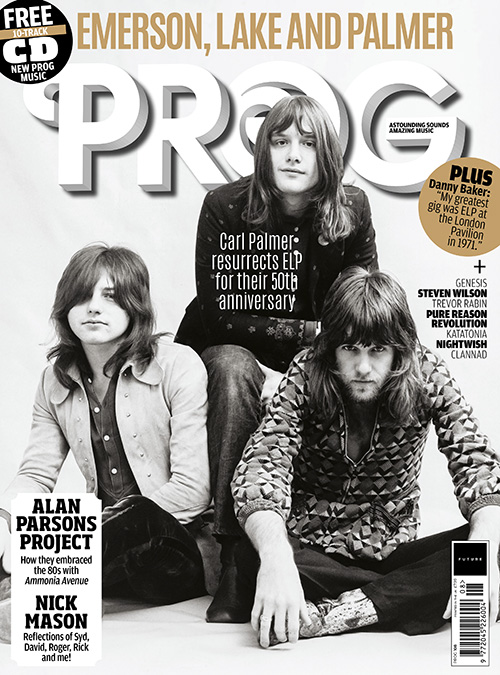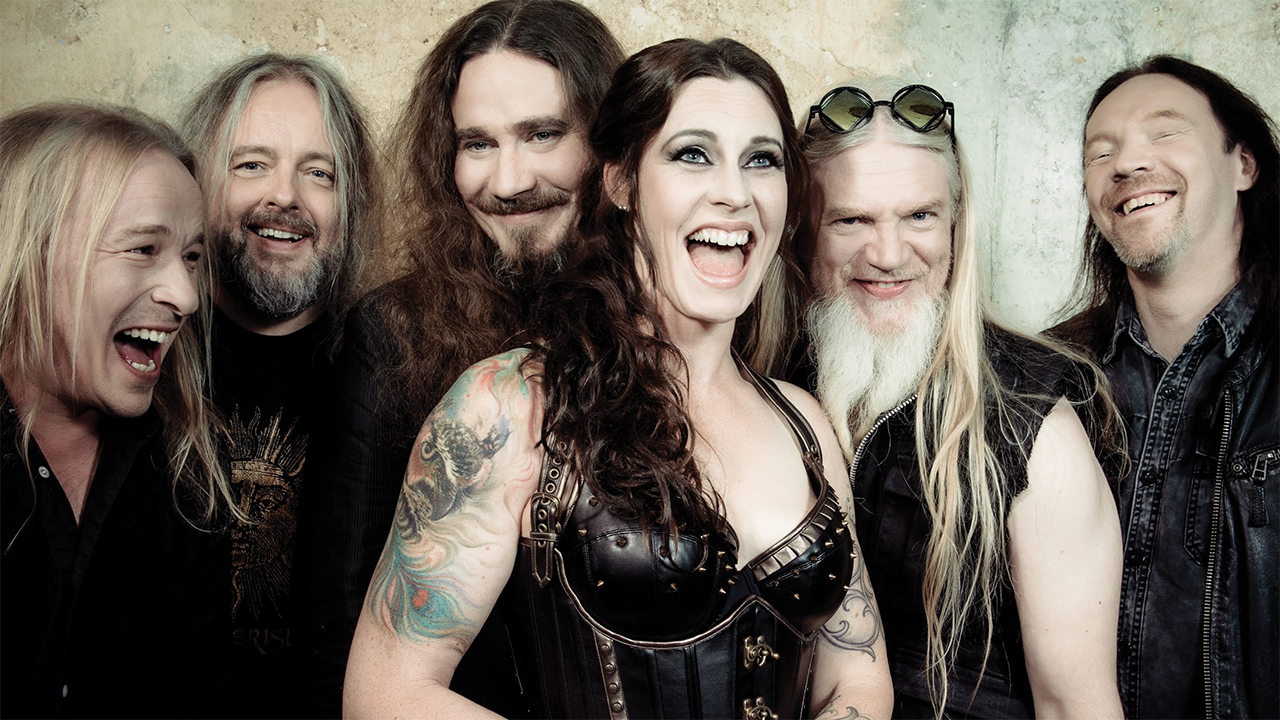In 2020, when Nightwish unveiled ninth album Human. :||: Nature. – their grandest musical vision to date, recorded before bassist Marko Hietala left – Prog spoke to Floor Jansen and Troy Donockley about the joy of vocal harmonies, breaking boundaries with their first orchestral suite, and being tipped as the future of rock and metal.
Five years since Nightwish’s last studio release, Endless Forms Most Beautiful, the symphonic metal giants have returned with Human. :||: Nature., a two-disc release: the first contains nine new tracks that cover just about everything from sweeping grandeur to folk harmonies and crushing metal riffs. That’s followed by the eight-part All The Works Of Nature Which Adorn The World, an orchestral suite that refuses to be bound by expectations concerning what rock or metal bands are capable of producing.
Human. :||: Nature. marks the second studio album for Floor Jansen and Troy Donockley since they officially joined Nightwish, and the first record with drummer Kai Hahto as a fully-fledged member. “There’s a constant reinventing ourselves going on, ever since I joined, at least,” says vocalist Jansen.
“There’s also been a real, tangible sense of freedom in what we do since the last album,” adds multi-instrumentalist and co-vocalist Donockley. “Maybe that’s something to do with us – me, Floor and Kai – being more established within the sound world of Nightwish now. We definitely felt like the sky’s the limit as to how we could push the sound.
“This album is still quintessentially Nightwish, but there are lots of different journeys to take within each song. In that way it’s really quite progressive. Our approach to our music has expanded with all of us; that includes Tuomas Holopainen [keys], Emppu Vuorinen [guitars] and Marco Hietala, [bass and co-vocals], not just me, Floor and Kai. It feels like we’re heading further out there, out into the wilderness of Nightwish.”
One of the changes from Endless Forms to Human. :||: Nature. has been the decision to pare back the orchestral and choral elements on the first disc, leaving more room for the band to showcase the vocals of Jansen, Donockley and Hietala. They started experimenting with close harmonies on the Decades tour in 2018 and it quickly fed into Holopainen’s writing.
“We started to use them in old songs, which gave them a completely different sound,” says Donockley. “But also it got driven home to us: the quality of each vocal, the quality of Floor’s stratospheric voice with Marco’s harder voice and my soft voice, the three of them. Bang, it just exploded!
“We’ve got a really interesting sound here, so that was inspirational: we could take the band into a new area because it hasn’t happened before. Then Tuomas went completely bananas and decided that he wanted three-part harmonies in every single song. So that’s what we did. In every song, we’ve got three-part harmonies – it’s quite a sound.”
It shows the rest of the genre that it’s a boundless one… you don’t have to be stuck in symphonic elements
Floor Jansen
New track Harvest taps into English folk, both lyrically and in the way the voices blend. As someone used to singing lead, it was an interesting challenge for Jansen to become comfortable with harmonising. “It requires a different kind of singing,” she says. “I’m personally not the best at this in particular – I can do the basics but it’s cool to see that Troy and Marco can be very creative; they’re more experienced with that.
“If you sing together, everybody needs to move towards each other in order for that sound to become one. It’s close listening; you need to determine the strength and the length of the vibrato. It’s nice that we can tune into each other quite naturally now.”
From the pastoral vibes of Harvest, the album shifts gears entirely into one of its heaviest tracks, the pummelling Pan, which in turn is followed by the celtic flavours of How’s The Heart? where Donockley’s Uilleann pipes come to the fore.
“It keeps us properly entertained!” says Jansen. “It just proves that the boxes we put bands into, metal bands or symphonic metal, it’s just a guideline really. It doesn’t hold us back. It’s not like Tuomas sits down at the beginning of the writing process and thinks, ‘Yeah, I want to write a very diverse album and all these elements have to be in there. I want more pop there, more folk there, it has to be super-heavy there.’ It just happens.
“There’s something unique and so recognisable in the sound of this band. It doesn’t matter whether it’s Harvest or Pan, it still sounds like Nightwish. That also shows the rest of the genre that it’s a boundless one and you don’t have to be stuck in symphonic elements just to be a symphonic metal band.”
That said, the band give fullest expression to their symphonic impulses on All The Works Of Nature, which isn’t what anyone really expects from a prog or metal band – although Donockley says it’s been a long time coming.
“To me, it was a given that we’d have a completely orchestral, extended suite,” he reveals.

“It was on the cards, because it’s such a vital component of the band’s sound. The idea of Nightwish is a big choir, a big orchestra. It’s going to raise a few eyebrows. People are going to be like, ‘What on earth are they up to?’ But it works perfectly. It’s within the universe of Nightwish. It could have been done years ago, but now is the right time.”
As they’ve become musically more adventurous and diverse, their profile has steadily grown. The video for Élan, from Endless Forms, has more than 65 million views on YouTube, and their latest video, Noise, passed two million views in its first three weeks. Their European tours sell out arenas, and they’ve built a huge and devoted fanbase in South America, where they shot the Decades: Live In Buenos Aires concert. The fans were so enthusiastic, they didn’t just sing the lyrics, but all the melodic lines from guitar solos to Donockley’s woodwind.
“On Élan, the introduction on the low whistle, I could hardly hear myself because everybody was singing – it was unbelievable,” he says. “There were times when Floor would have to stop and wait for it to subside, but it didn’t! She had to go, ‘Thank you very much, but do you want to hear a song?’ It’s crazy; they’re wild over there. But we love it.
“It can be a bit hairy at times if you’re out on the streets and you get mobbed. It’s like being in The Beatles when you go to South America. Then you come back here; I’m just outside of York, I’m in Morrisons, and nobody cares. Nobody runs after me in Morrisons.”
With that level of adulation, supermarket anonymity notwithstanding, Nightwish are one of the very few bands big enough and good enough to carry the torch for rock and metal as the titans who built the genres move into retirement. Someone has to be able to headline Wacken and Download and pull in the crowds if the music is to have a future.
“That’s an interesting thing,” says Jansen,“because it’s going to happen; and out of curiosity you start to think about it. But then again, things happen the way they happen. It’s not an ambition in that sense. We’re very satisfied with where we are, but I recently read an article where Steve Harris from Iron Maiden said, ‘If any band can carry our torch, it’s Nightwish.’
“It’s a huge honour, really massive, and you think, ‘Yeah, wow – do we even want that?’ There will definitely be a shift and we’ll take it as it comes. But it’s an honour that people like Steve Harris consider us to be a proper torchbearer.”




